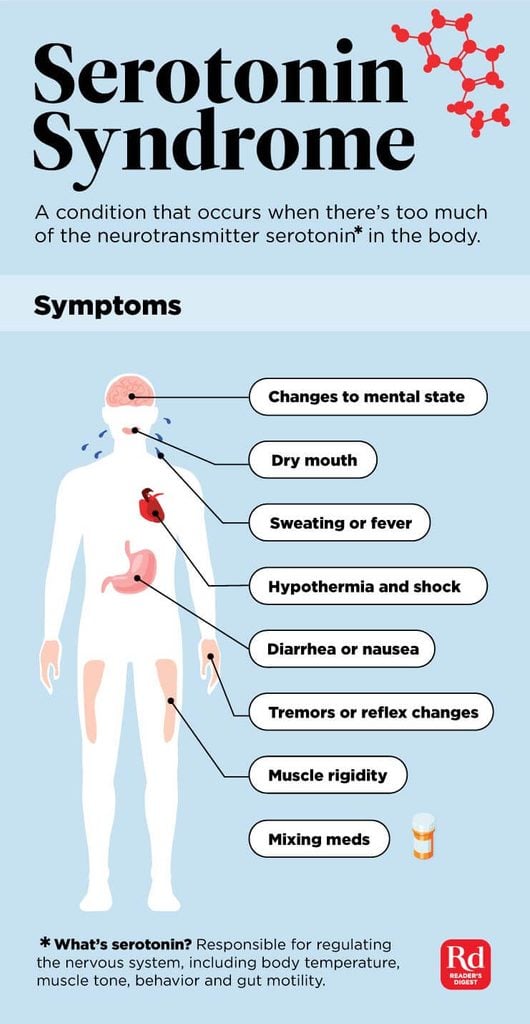7 Silent Signs of Serotonin Syndrome
Updated: Apr. 01, 2021
Symptoms can range from mild to severe—and if left untreated—can even be deadly.
To know what serotonin syndrome is, it helps to know what serotonin is: This neurochemical is a nerve transmitter in the brain and body that is connected to mood—it’s a target of antidepressant drugs, for example. The trouble starts when there’s too much serotonin (yes, there can be too much of a good thing). An overload can lead to very troublesome symptoms like muscles locking up and fevers.
Serotonin levels can build when you’re taking medications that support the neurochemical. These include some migraine medications amd antidepressants (the ones known as selective serotonin reuptake inhibitors—SSRIs). The risk magnifies when people mix prescription meds with illicit drugs such as ecstasy, supplements such as St. John’s Wort, cold medicine containing dextromethorphan, and some anti-nausea medication. Take special care if you’re taking migraine medications known as triptans (such as Imitrex or Zomig) together with SSRIs (such as Celexa, Zoloft, or Prozac) or serotonin/norepinephrine reuptake inhibitors, SNRIs (such as Cymbalta or Effexor). Serotonin syndrome symptoms tend to present within 24 hours of a change in dosage or medication regimen. (Related: Watch for these sneaky migraine triggers.)
With treatment, serotonin syndrome symptoms typically disappear quickly—but left untreated the condition can be deadly. “Serotonin is responsible for regulating the nervous system, including body temperature, muscle tone, and behavior, gut motility, and constriction of the blood vessels in the body. When levels are high, the different body systems regulated by serotonin get over-stimulated,” says Jeahan Colletti, MD, an emergency medicine physician at Mayo Clinic in Rochester, Minnesota.
It’s possible to prevent serotonin syndrome, mainly by managing your prescriptions. First, it’s important to discuss with your doctor and your pharmacist all the medications you’re being prescribed. You need to understand any potential side effects and drug interactions you may experience. Your doctor should also practice caution, especially if the medications are new to you. “It is extremely important that providers are familiar with medications that increase serotonin neurotransmission, and are cautious when prescribing these medications. They should be introduced very slowly and discontinued if the patient experiences any serotonin syndrome symptoms,” says Dr. Colletti. These are the questions you should ask your doctor before taking any prescription medication.
According to the U.S. National Library of Medicine, there are a number of symptoms of serotonin syndrome. Here are the ones to be aware of:
Changes to mental state
One of the telltale symptoms is changes to your mental state including anxiety, confusion, irritability, and delirium, since the chemical plays a role in mood regulation.
Diarrhea or nausea
Serotonin is primarily found in your digestive tract and helps regulate bowel movements and digestion. A sharp increase in the chemical may cause nausea, vomiting, or diarrhea.
Muscle rigidity
Your muscles feel tense, stiff, or painful for no obvious reason. A doctor may prescribe a sedative to ease discomfort until serotonin levels return to normal.
Dry mouth
This can be a side effect of some antidepressants, but if it’s new to you, it could signal an overproduction of serotonin, especially is you’re on multiple medications or have used stimulating drugs, like cocaine, amphetamines, and LSD.
Tremors or reflex changes
Your limbs feel shaky or spasm, reflexes seem overactive or exaggerated, or you are suddenly uncoordinated.
Sweating or fever
Excessive sweating when you’re not exerting yourself, or fever without any other symptoms of a cold or the flu.
Hypothermia and shock
You get progressively sicker and potentially develop hypothermia or go into shock.

















